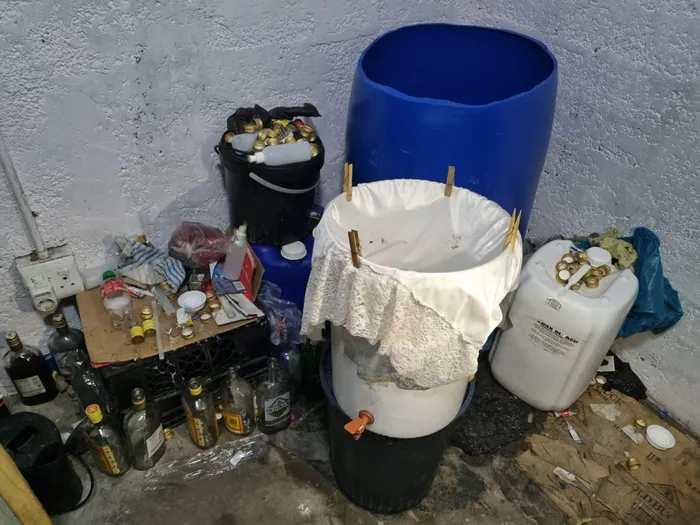The alarming rise of South Africa's R25 billion illicit alcohol trade

Barrels of fake booze found in an abandoned building in Dunoon, Cape Town.
Image: Supplied
South Africa is facing a dangerous surge in the illicit alcohol trade, now worth over R25 billion, with mounting consequences for public health, consumer safety, and the national economy.
As the black-market industry grows, so do the body counts.
The Drinks Federation of South Africa (DF-SA) this week released research revealing that the volume of illegal alcohol has increased by 55% since 2017, reaching 773,000 hectolitres in 2024.
This amounts to 18% of all alcohol sold in the country.
Head of Research at DF-SA, Dr Shamal Ramesar, warned that the figures should serve as a wake-up call.
“This study is a wake-up call. Communities are being exposed to harmful, unregulated alcohol, and the country is losing billions in revenue.
“It is urgent that government, industry and civil society work together to tackle this issue head-on,” he said.
The illicit market is valued at R25.1 billion this year, nearly double what it was in 2017, and has led to R16.5 billion in lost tax revenue for the government, with counterfeit white spirits accounting for the bulk of the losses.
These aren’t just economic concerns; the human cost is increasingly visible.
In August 2024, in the close-knit farming community of Koelenhof near Stellenbosch, four farmworkers died after drinking what is believed to be expired or counterfeit alcohol sourced from a wine farm.
Monecia Alckers was the sole survivor among her group; methanol poisoning was suspected after consuming the alcohol.
Her sister, Jestine Alckers, said the group had previously consumed the same drink with no side effects, but this time, the outcome was tragic.
“They first complained about their eyesight, then they were nauseous and vomiting after drinking. And the following day they were dead,” she said. “We thought they had eaten something, but now we believe it was poison.”
Police confirmed that four inquest dockets were opened.
The National Liquor Traders Council has long warned of this growing threat. Convenor Lucky Ntimane said the problem has deepened since the Covid-19 pandemic, which created the space for unlicensed sellers to thrive.
“We urge our liquor traders not to purchase from unknown or suspicious sources, especially those selling below market value or with tampered packaging,” said Ntimane.
“These fake products are not only illegal, they are killing our people.”
Traditional leaders are also raising an alarm.
Sikelela Zokufa, founder of the Somagwaza Institute and a respected traditional surgeon, said illicit alcohol has infiltrated umgidi (traditional celebrations after initiation) season celebrations, endangering the lives of young initiates and their families.
“People want cheap and quick stock without considering the danger,” he said. “Some are even being scammed; they pay, and the delivery never comes. Others unknowingly feed poison to their guests.”
Zokufa urged communities to plan properly for traditional gatherings and join savings groups known as migalelo to buy from legitimate suppliers.
“It’s better to serve what you can afford than to serve poison and bury your loved ones.”
A national survey conducted alongside the DF-SA report found that 80% of South Africans are worried about the health risks of drinking unregulated alcohol.
Nearly half said they know someone who was harmed by illicit alcohol, and 29% know someone who died from it.
Among the biggest culprits are counterfeit spirits, particularly low-cost vodka and gin, along with smuggled alcohol, which still makes up a quarter of illicit stock despite a decline.
The DF-SA is calling for a coordinated crackdown involving law enforcement, the liquor industry, and the government.
“Until we shut down illegal production chains and raise awareness, more lives will be lost,” warned Dr Ramesar.
South African Liquor Brandowners Association (Salba) CEO Kurt Moore added that the illicit trade of alcohol harms the government because of the revenue loss.
“At the same time, the sale of illicit alcohol presents a health risk for consumers as illicit traders do not comply with the stringent manufacturing regulations.
“The manufacturing of these illicit products has become more sophisticated, making it more difficult to identify illicit products. Illicit traders also target white spirits because these products are easier to counterfeit.
“Illicit alcohol does not comply with the stringent manufacturing regulations, which pose a risk to consumers. The report does contain some insights from consumers who claim that they do know of individuals who were harmed by illicit alcohol, and some who have died having consumed illicit alcohol. Unfortunately, these illicit products are found in both the informal and formal sectors.
“Spirits are the most impacted by illicit trade.”
mandilakhe.tshwete@inl.co.za